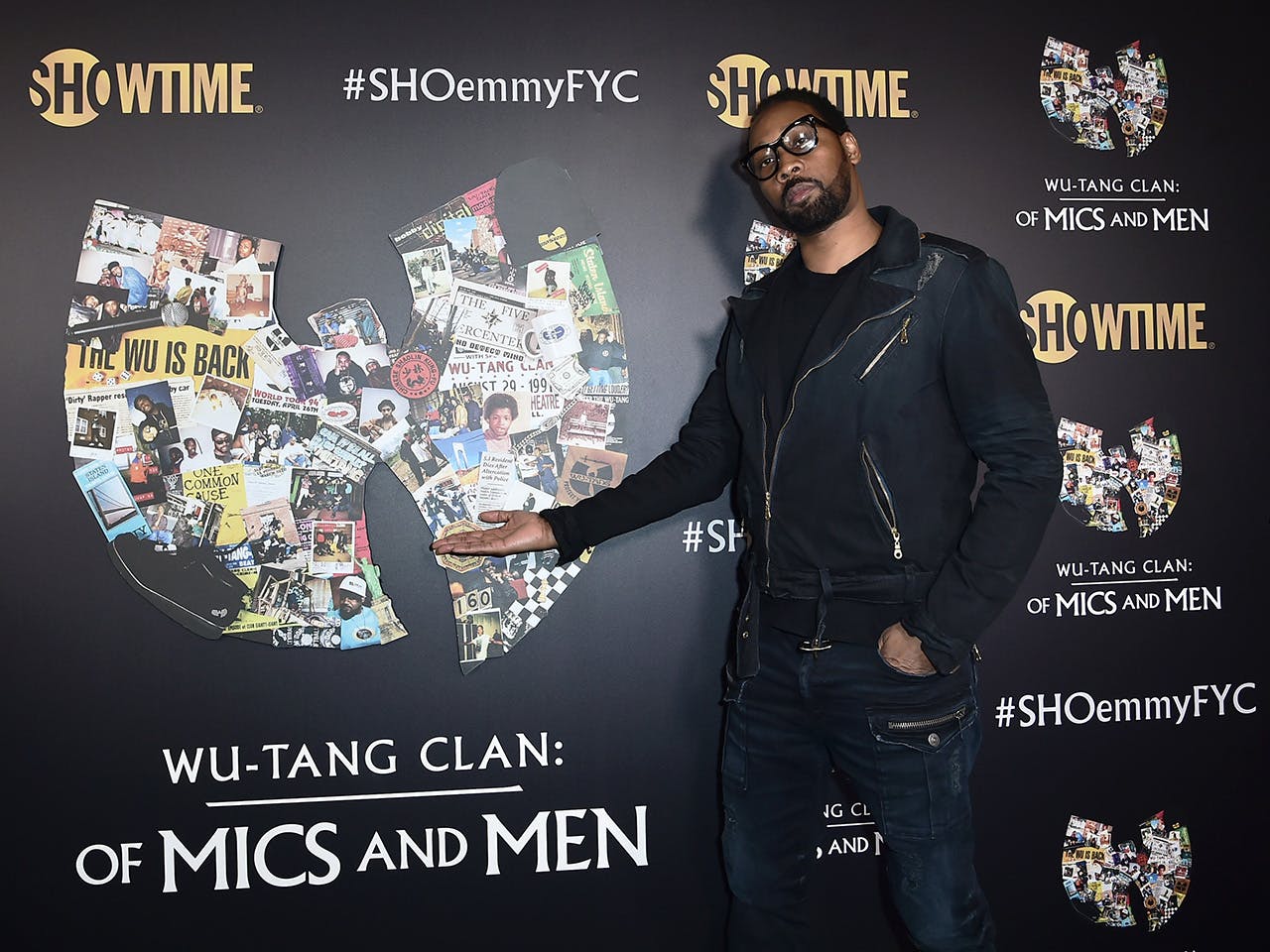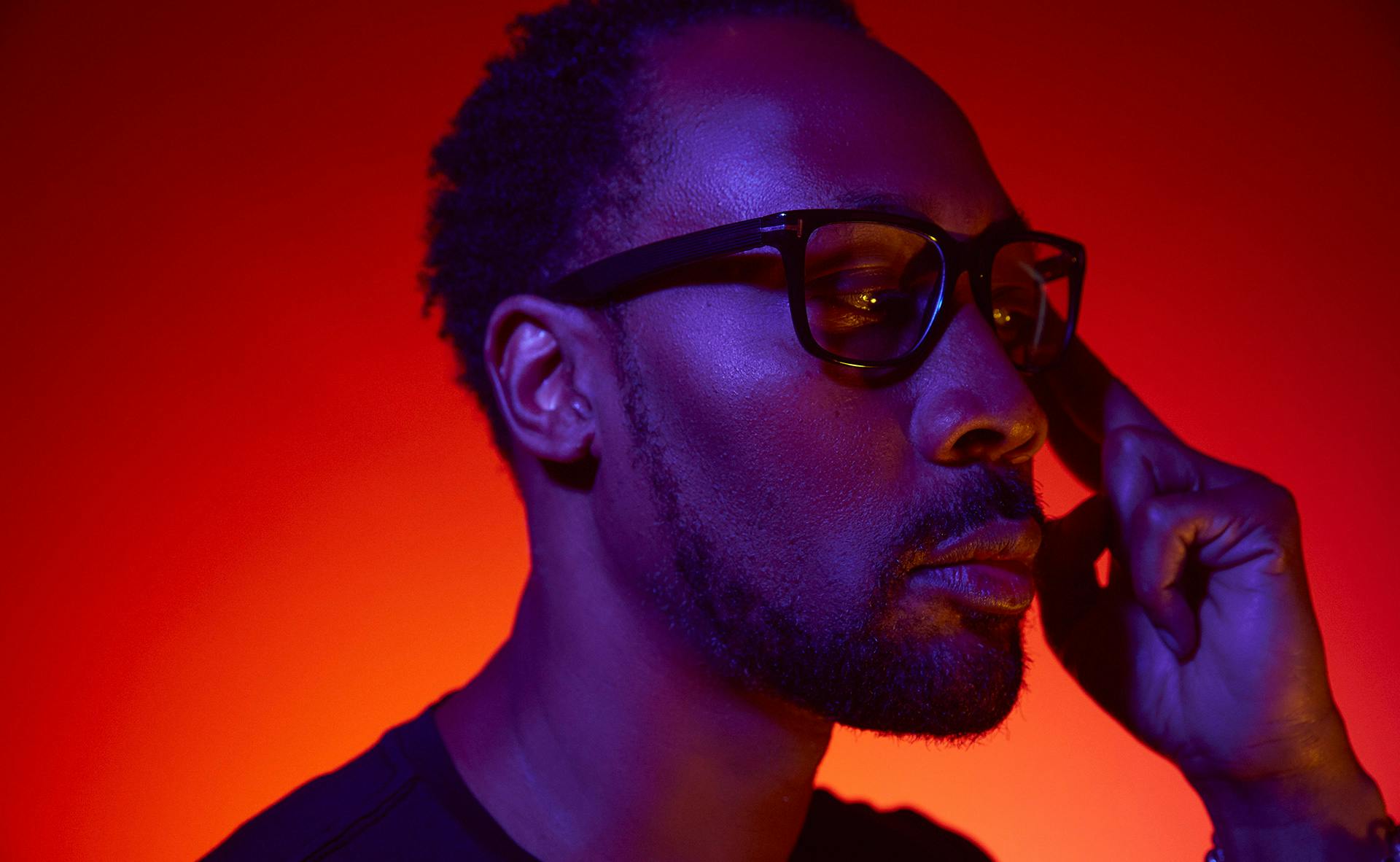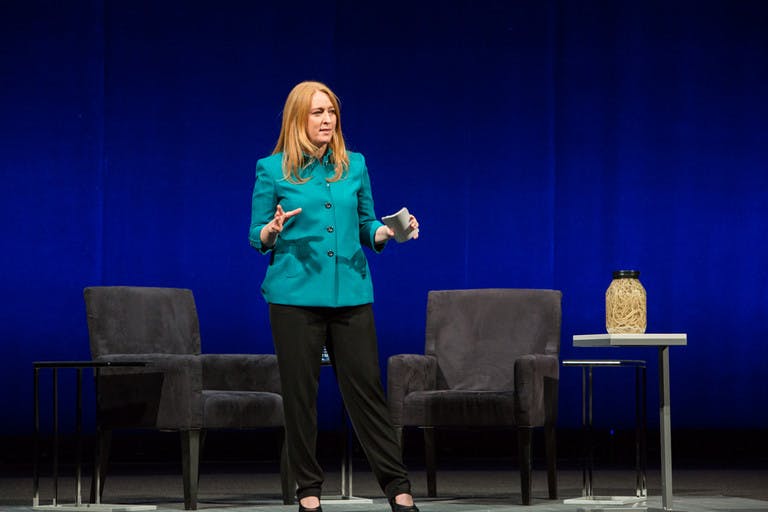RZA didn’t have the kind of childhood that seemed destined for success. Born Robert Fitzgerald Diggs, he bounced from Brownsville, Brooklyn to Murfreesboro, North Carolina to Steubenville, Ohio, wherein 1990 he was involved in a shoot-out and faced 8 years on a charge of attempted murder. After being acquitted, RZA settled in the Stapleton Projects on Staten Island, where he formed — and became the “abbot” of — the Wu Tang Clan. Their 1993 debut, “Enter the 36 Chambers,” became a classic and introduced a whole new sonic language to hip-hop, where references to metaphysics, kung fu flicks, and crack deals somehow lived side by side.
RZA went on to produce acclaimed scores for the Quentin Tarantino classics “Kill Bill” Volume 1 and 2, to score and act in Jim Jarmusch’s “Ghost Dog: The Way of The Samurai,” and act in TV films and TV shows including “American Gangster” and “Californication.”
Most recently RZA produced an original series for Hulu, “Wu-Tang: An American Saga,” and directed the upcoming film “Cut Throat City,” starring Wesley Snipes, Ethan Hawke, and Terrence Howard. In February, he will return to his role as the abbot, overseeing a two-day immersive Zen camp on Staten Island, where he will lead aspiring creators through inspirational workshops and activities to help harness their creativity and unlock new hidden potential.

Dimitri Ehrlich: You’re going to be the guide for Camp TAZO: Zen in February 2020, on Staten Island. What exactly will you be doing in those sessions?
RZA: There will about five different activities: still meditation, moving meditation, changing perspective on things — those types of explorations to unleash an individual’s creative freedom.
DE: What made you want to do participate in this camp?
RZA: If you look at my Wu-Tang roots, it was a bunch of alpha males. So how did all these alpha males come to give their respect and homage and go under the tutelage of another alpha male? That alpha male has to have certain qualities. And that’s what made me the Abbot of the Wu. So that’s the energy I’ll be bringing to this camp.
In the same way, if you go back and look at some of our earlier productions with the Wu, let’s use Ghostface for example, you see how his lyrical content kept increasing and that’s due to the time he spent with me and unlocking his own potential. It was his potential, but it was my inspiration.
I’ll give you one example: if you go back to “Wu-Tang Forever,” there’s a song called “Impossible” with Ghostface where he says, “Call an ambulance, Jamie been shot,” and the emotion in his voice, it puts you right there. Everything he’s saying, the intonation of his voice; he’s not just rapping, he’s putting emotion into his voice. The Source called it the lyric of the year. That’s the creative potential he had, but he wasn’t fully open.
We know that a lot of people run around and constantly hustle every day and you’re going through what you’re going through, but you might not take time to sit down and let your creative flow guide you and direct you. You’re being led by the current of a drive for your economics.
But through this camp, we can help individuals be led by the currency of their creativity. At the end of the day, we live in a capitalist society in America, but I never was looking for money when I was doing Wu-Tang, I was looking for expression. The expression created something of value. “36 Chambers” wasn’t made on a big budget. It was made on a minuscule budget, mostly from time and dedication and creative energy.
So returning back to the abbot is the main thing for me.
RZA: In reality, wisdom is comprised of two words. Wise and dome. What is your dome? Your dome is your domain. Your first domain is your body. And the thing that activates your body is your mind. You have to have a wise dome.
Wisdom is the accumulation of experience. The wise man accumulates experience without having to physically go through the experience. Most things have already been recorded. You can learn to become a black belt but you’re not learning something new. You’re learning something that has been defined. But it has not entered your domain, therefore, you have to wise your domain and then that wisdom flows through you.
It can also be wise words. The word is something that sparks everything. [The Zen patriarch] Bodhidharma took it to the highest level. Which is Zen. And we’re using Zen as a foundation at this camp. In Zen, sometimes there are no words being said, but even when Bodhidharma doesn’t speak, one out of a thousand still gets the message. That’s the unspoken word, but that word is only heard inside the dome. That’s called heart to heart, which is where the Heart Sutra comes from. It doesn’t have to be produced by the mouth: it’s still a word. Even if we stop talking now, words still keep going on inside your head.
DE: What does it mean to you to free your mind?
RZA: Your mind is born naturally free, but we’re good at capturing it. We capture it ourselves by putting it inside boxes and labels. But once you remove the labels, you automatically return back to your free mind. A baby is born with a free mind. Melly Mel said, “a baby is born with no state of mind, blind to the ways of mankind.” He’s saying, a child is innocent of anything we want to say--even the question of “is it a boy or girl? Is he black or white?” A baby has none of those things going through its mind. It’s free, basically in a state of joyful bliss. A baby even gives off a pheromone that when you smell it, you get a euphoria about things. So that free mind is basically returning back to your essence.
Where does the Buddha exist? The Buddha exists in your mind. Outside your own mind and body, there is no Buddha. We put all these traps upon ourselves, whatever label or conditioning if you can remove the trap, you can free your mind.
Bodhidharma even said words are traps for ideas, once you have the idea, you don’t need the word anymore.
DE: Mindfulness has become a huge buzzword in the last 10 years but so far not really become a big thing in the hip-hop community—in what ways do you think mindfulness needs to be tailored specifically to a hip-hop kid today?
RZA: I don’t think I have to tailor it or customize it; I just have to become a living example of it. Which I’ve been doing throughout my career. If you go back and listen to the Wu-Tang, you will hear references to mindfulness, references to deep breathing, references to chi gung. I mean I got a song called “Chi Gung.” The ultimate extreme is no extremities. Tai chi comes from wu chi, which means no extremities. We use tai chi to deflect our enemies; we’re not attacking but we’re using yin and yang to deflect our enemies.
“Fusion of the five elements, to search for the higher intelligence.” That’s one of my lyrics from the song “Impossible.” What is the fusion of the five elements? That’s the study of the internal martial art, hsing yi. And fusing them and understanding how those five elements relate, that’s Taoism and Buddhism mixed together. That’s the style of kung fu that the Wu-Tang teacher taught up in the Wu-Tang Mountains. But if I put those words in my song, maybe one out of a thousand kids will research and find it.
That’s the thing about Zen: everyone has the ability but Bodhidharma says it may be only one in a thousand who gets it, but when one gets it, the light of it is so bright that it could spark another light. And that’s the goal. This camp is based on that theory if one person walks out of there and their creativity is freed… look at a guy like John Lennon, who after having all the money in the world went and wrote a song like “Imagine.” All the money, the power, the drugs, the sex--it wasn’t sufficient. His heart was free, and once he had all these freedoms, that leads to that awareness. So, if someone walks away from this camp and writes a great song, or paints a great picture or designs a great building, maybe that becomes something that sparks us further on.
DE: What is your daily meditation practice like?
RZA: I don’t have a formal practice actually, but every day is new to me. In one capacity. And then there’s the reverse side of that equation, since there’s also nothing new under the sun. But it’s new to me because I am experiencing it. Like right now, I’m in Denver, Colorado and when I talk, I walk and I pace. So, I’ve been walking in circles the whole time I’m talking to you, and that circle of movement keeps my chi going. The sunlight in my room, the view out of my window, all that is energy for me, and it gives me focus. So, when it’s time for me to sit down at a piano or focus on a beat, my energy flows like a lightning rod. And then I let it come to a direct location. So, it varies every day how that occurs for me.
DE: Your first single was "Protect Ya Neck,” which is an admonition to survive. But in Buddhism, you might say an even more important precept is to protect your head—meaning your heart and mind. In the Lama Chopa, it says, “even if all the beings of the world become abusive, critical, or even kill me, undisturbed I will work for their benefit.” We live in a world of dog-eat-dog competition. How does someone balance the Buddhist principles of nonviolence and compassion with the "every man for himself" ethos of the streets?
RZA: Even Buddha punishes evil, though. The idea is to be as merciful as you can. Mercy can be patience and tolerance, like Gandhi who was deep into Hinduism, he taught to turn the other cheek. Non-violence. You can go back and find the same teachings in Jesus. It’s good to turn the other cheek, but what happens when both the cheeks have been slapped?
It’s good to lead by example. But now you’re forced to do something. You can be merciful but when it comes time to exact punishment, it’s merciless. I give everyone a fair chance, whether it’s my children or my crew. Like if you notice, sometimes you hear the guys in the Wu-Tang crew put out real negative statements about me, but you don’t hear my rebuttal because at the end of the day the truth exists and because I have respect and love for the individual, and I have the patience to wait for the truth to manifest itself.
If I tell you that 5 times 25 is 150 and you just accept that on face value and walk, then you can live with that until you take time to count it and realize 5 times 25 is 125.
So, the answer always existed, you just wasn’t aware of it. So, if men walk around deluded searching for things that don’t exist, wasting their time with things that are burning their time, reality is always there in front of you. So Bodhidharma says, there is no reality outside of this reality. People who think they’re gonna go meditate and find themselves in some paradise full of beautiful fruits and vegetables, well… that’s earth! Where you think you’re going? You gotta find that here.
DE: Speaking of beautiful fruits and vegetables, you’re a vegan.
RZA: [laughs]
DE: When did you become vegan and why?
RZA: I went vegetarian first in the 90s. I decided no animal needed to die for me to live. Didn’t make no sense. There was no reason that an animal should die for me to live. Most of these animals get their food, clothing and shelter from the earth, and in time I increased it to take away the milk because of the suffering the animal goes through to give the milk and also because, yeah, it’s healthy for a kid who can’t be nurtured by his parent, but for a grown man--why would you drink milk that’s made for a baby? The egg was the last thing I let go. It was a weird thing for me on the egg. It became more awareness of the porous nature of the egg itself. Everything that’s used, the hormones and the way they clean them, all the chemicals that soak through that egg. And then we sit there and scramble it up and swallow it down. It don’t make pragmatic logic for me. So, my first thing was preservation of life. As Buddha said, all life is precious. There’s no reason for me to sacrifice a living being. All life deserves to live. Not even a fly wants to die. The same nutrients are available and then of course what the Food and Drug Administration are doing took me further away from the cheese and the eggs.
DE: Today there are so many apps like Headspace, and Inscape offering meditation on the smart phone. What do you think the future of mindfulness is as it relates to technology and AI?
RZA: I think it’s gonna have its benefits as well as its bad side. Usually things start out good like even an apple starts out as a good fruit but if you leave it out it gets rotten. But even when it’s rotten the worms and microbes and lower species consume it. So, I use that analogy to say technology is gonna put us in a rut for a while but we’re gonna grow out of it.
The idea is there’s nothing new we’re doing, it just appears new to us. Men always go through a period of creation and we cause our own destruction. So, my answer is that the reality of man is so real that nothing is going to ever fully destroy it. But at the same time if you look at our planet, this global warming keep intensifying over the next 50 to 100 years. Don’t we know the earth has its own intelligence? Even a sperm cell knows where to go. Even a flower knows how to reproduce itself! The earth is going to freeze and go back to the ice age and that will decrease our human population.
DE: You named your alter-ego Bobby Digital. These days many people see digital addiction and social media and screen time as the enemy of mindfulness. How do you reconcile Bobby Digital with RZA as the “abbot”?
RZA: My context for using Bobby Digital was that you gotta become digital in your own mind. You gonna depend on your device to do your calculations? You gonna depend on these zeroes and ones to define everything around you? No. Before you get trapped in cyberspace, you gotta go back and study your inner space! And you will realize it’s as vast as your outer space.
So, Bobby Digital was a character to show someone trying to go from their lower self to their higher level. Some of the lyrics had very sexual oriented ideas conflicting with good and evil within himself. Bobby struggles. He’s here to help others and still struggling within himself. I’m here to help you but I’m still fighting my own demons. You go to the great teacher Jesus: he fasted for 40 days and during those 40 days, he was tempted, yo, even though he was the one save everyone from their temptation.
So that character of Bobby Digital was a medium to show the balance and the off-balance, and to show that, yo, that’s what I go through. My goal is to be the abbot.
The crazy thing about me is the Z in my name is a symbol of changing of directions. That’s why I chose the Z. There’s no vowel between the R and the Z, it’s pronounced RZA but the Z is because sometimes I’m heading in the right direction, but my human nature attracts me to the other direction. But my strength and willpower and mindfulness lead me back into the right direction. My goal is to keep moving in the right direction.











